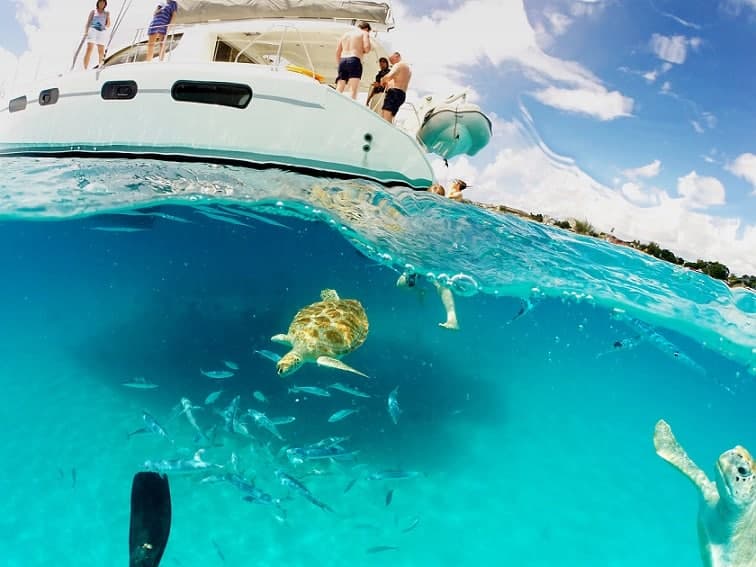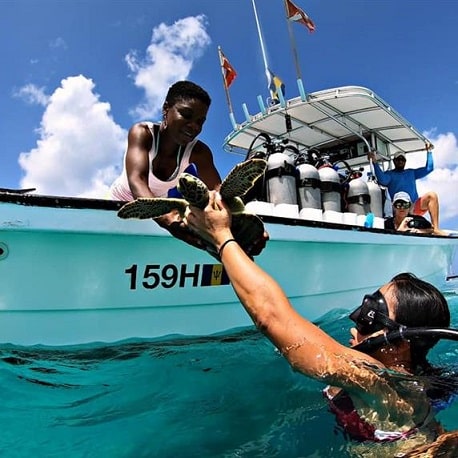The sea turtles have become a favorite marine attraction for many visitors to Barbados, and while these descriptions are all accurate, environmentalist, Carla Daniel, an ambassador of Barbados, knows that these beauties are also critically endangered.
For over a decade, Carla has been busily raising awareness of the plight of sea turtles in her home island Barbados. As Director of Public Awareness and Education with the Barbados Sea Turtle Project (BSTP), Carla’s relentless passion for the environment and marine life, in particular, have helped to drive a movement in Barbados encouraging citizens and visitors to be more cognizant of the more vulnerable species who share the lands and seas. The young, but very experienced, environmentalist strongly believes that it is only through education and awareness that the Caribbean can reap success in its conservation efforts.
Carla’s wealth of knowledge is fueled by both her extensive academic background and her practical experience in the field. She possesses a Master of Philosophy in Biology from the University of the West Indies (UWI), which has allowed her to extensively research Barbados’ complex ecosystem. Carla’s natural charisma, the wealth of knowledge and love for her reptilian friends, have had a profound impact on Barbados’ tourism. It is truly unique how her passion has positively influenced even those who were previously unfamiliar with her cause.
International volunteers sign up each year to participate in the BSTP’s programs including beach patrols during nesting season and turtle rescues. There are also many other tourists who participate in varying watersports and marine activities who catch a glimpse of Carla’s work and are immediately intrigued. While she highly appreciates the enthusiasm shown by tourists in their interaction with turtles, she emphasizes that the role of sea turtles in Barbados is invaluable.
“The value of sea turtles to Barbados; you cannot put a dollar amount on it,” she shared. “Turtles give Barbados the edge perhaps over competing countries, where there is also pretty sand, wonderful culture and good music. There is also sunshine all year-round, but they don’t have the opportunity to come down and see hatchlings going into the sea on a beach, they don’t have the opportunity to see our turtles,” Carla added.
Mr. Jens Thraenhart, Chief Executive Officer of Barbados Tourism Marketing Inc. (BTMI) said:
“The Hawksbill turtles and their unique nesting patterns make up a significant aspect of the high interest in Barbados’ eco-tourism offerings.”
He explained that as fascinating as it may be for visitors to see these large turtles in their natural habitat, there are several precautions that visitors should keep in mind. This is especially so since the early phase of the sea turtles’ nesting season coincides with Crop Over, Barbados’ major cultural festival which transforms the island, and beaches by extension, into a hive of non-stop excitement.
Long a proponent of conservation and sustainability, Thraenhart shared that Barbados was recently included in a documentary series released by Sustainable Travel International entitled Sustainable Travel: Where Next?
“It is a major accomplishment for Barbados to be included in this important global documentary, besides other destinations including Edmonton and Victoria in Canada, Park City, Utah, Vail, Colorado and Sonoma County, California in the USA, Oslo in Norway, Ljubljana in Slovenia, Australia, Denmark, and St. Kitts as the only other country in the Caribbean, on one hand to position ourself to the increasing share of travelers that want to travel more sustainably, especially young people, but also as a catalyst to drive our sustainability journey to mitigate existential threats like climate change,” he said.
Barbados Commitment
The commitment to Carla’s mission was nationally highlighted in 2018 after she made an impassioned plea via social media to halt an event that was slated to be held at Drill Hall beach in St. Michael. While it is very common to host events on the island’s many beaches, the particular event would have had a deadly and devastating impact on the eggs which are laid about 50 centimeters below the sand’s surface. Carla emotionally explained to the public that while she is in full support of parties and such activities, the weight of tents, the erection of stages, in addition to the constant pedestrian traffic on the shore would undoubtedly be at the cost of the lives of hundreds of young turtles.
Carla’s plea was not only heartfelt, but also accurate, and many members of the public rallied behind her. The event was restaged, and this was considered a major win for the activist. If not for Carla’s efforts, the loss to the marine habitat would have been unimaginable. As she said, “every nest is important.”

Through Carla’s work and that of the BSTP, Barbados has made much progress and has established quite a high standard. “There are still countries within our region that have open seasons on turtles. We [Barbados] have a moratorium that has been in place since 1998. We have a beautiful history of respecting our environment, maintaining the beach habitat that is so vital for turtles.”
Though Carla’s work is based in Barbados, her reach has been extended to countries thousands of miles away. Many of her sea turtle rescues are recorded and viewed by thousands via several social media applications. Viewers are amazed by the risks she is willing to take to protect the integrity of popular nesting sites and save wandering hatchlings from the dangers of wild animals, busy roads, and other forms of human negligence.
She has been seen covered in the mud from swamps and the dust and debris of construction sites, all in efforts to save female turtles who came ashore to lay their eggs but became disoriented or trapped. She even jokes that on New Year’s Eve 2018, she received an urgent call about a turtle in distress along the West Coast via BSTP’s 24-hour hotline. Dressed in full formal attire for what was supposed to be a night of celebration, Carla zipped down to the beach in search of the unlucky reptile, who was then rescued and returned to the waters – in grand style.
Carla and her team of volunteers have done an extraordinary job in helping to curtail common but extremely damaging beach activities which were severely compromising Barbados turtles’ wellbeing. One such habit is driving along the beaches. It’s true: an up-close view of Barbados’ beaches, whether by day or night, is one of the most calming and pleasant experiences one can have. But, as Carla has repeatedly pointed out, the way to do this is not by cruising your vehicle over the fragile shore.
“It destroys our beaches. It is horrific,” she said. “For you, it is the convenience, but for the sea turtles and other forms of life on the beach, it is life or death.”
This practice has proven deadly for the turtles as the weight of the vehicles leads to compaction of the sand, which makes it almost impossible for them to nest. Even worse, there is the risk of crushing the eggs which have already been laid or driving over tiny hatchlings who are trying to wiggle and fight their way to the sea.
Carla Daniel is one of the leading conservation activists in the region. In just a few years, she has broken local and international barriers in her aim to educate and inspire people to be more conscious of their actions and the subsequent impact on the environment. Her influence is seen as thousands of people from all across the world tune in to her daring rescues of the endangered Hawksbill turtles, and there are many who book flights to Barbados to play their part in protecting the turtles and other marine life. Carla’s work is truly remarkable, even heroic, as she leads the charge to ensure that Barbados remains a paradise and haven for locals, visitors, and of course, the turtles.
For more information on travel to Barbados, go to visitbarbados.org, follow on Facebook, and via Twitter @Barbados.





